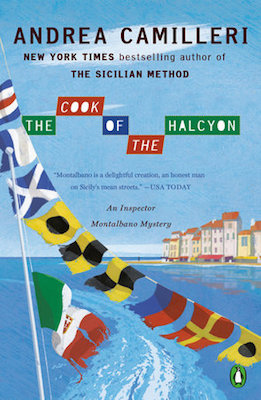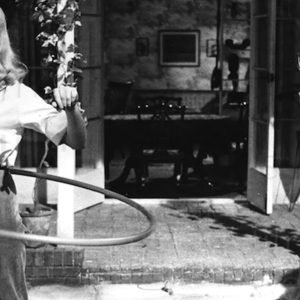
“Can I come in?” asked Fazio.
“Yeah, come on in. So you’re only getting back now?”
“Chief, would you believe it if I told you I didn’t even have time to eat lunch?”
“Where were you?”
“Still at Trincanato’s.”
“Did something happen?”
“First, two of Spagnolo’s kids came. Spagnolo was the worker who hung himself. But the guards didn’t want to let them into the hangar.”
“Are they minors?”
“No way! One’s thirty, the other’s twenty-eight. Both without jobs. Sacked. At any rate, things could have got out of hand if we hadn’t been there . . .”
“And then what?”
“And then, when the prosecutor and Dr. Pasquano were done and the body was taken away, Giurlanno, Spagnolo’s oldest son, stayed behind and talked with his dad’s friends.”
“What was he saying?”
“I don’t know, I didn’t hear. He was speaking softly. But I could tell the situation was changing. At first they’d all seemed grief-stricken, but now they were starting to get pissed off. And at that exact moment, Trincanato’s car came out of the office building’s garage with him at the wheel.”
“What time do you think it was?”
“I dunno, maybe around two-thirty.”
Montalbano and Augello looked at each other. Trincanato was clearly going out to pick up the American girl at the trattoria.
A cell phone rang. Mimì dug one out of his pocket and brought it to his ear. Then he stood up.
“Excuse me a minute,” he said. And he left the room.
“Go on,” Montalbano said to Fazio.
“All of a sudden the workers rushed towards the car to try and stop it, and at the same time the guards hurried over to protect it. But Trincanato stepped on the gas and got away, practically running one guy over in the process. Both groups were running so fast towards each other that they inevitably clashed and came to blows.”
“Are you telling me they were unable to stop in time? That there was no aggression on the part of the workers?”
“Chief, that’s what it seemed like to me, at least at the
start of the scuffle. After, well, you know how it is . . .”
“No, I don’t know how it is. You tell me.”
“One guy says one thing, another guy raises a hand, and the whole thing snowballs from there . . .”
“And you guys didn’t intervene?”
“Chief, given the clear disparity between the sides . . .” said Fazio, dodging the question.
Montalbano glared at him. Fazio looked down.
“Tell me the truth,” the inspector ordered him. “Come on, Chief, wasn’t it better to let the workers blow off a little steam?”
“But the guards were armed! They could have shot somebody!”
“Chief, the first thing the workers did was disarm them. Then Gallo and Galluzzo had them turn the guns over to them.”
“Okay, I see. Are you going to tell me when you decided to intervene?”
“At the end.”
“At the end of what?”
“The dustup.”
“You mean when the guards were so battered with punches and kicks that they were on the ground and could no longer get up?”
“More or less. The guy in the worst shape was the ex-contractor. But when I asked him if I should call an ambulance, he said no. He was afraid to lose face, I think.”
“Did you give ’em back their guns?”
“Yeah. And so they went to get themselves bandaged up, and we guarded the establishment until a new shift of security guards arrived. And now, with your permission, I’d like to go home and get some rest.”
“Go ahead. I’ll see you tomorrow.”
Naturally, Adelina didn’t find any fresh fish at the market, either. So she made him three beef cutlets alla pizzaiola and a large platter of caponata.
A day of earthy, rustic stuff.
He ate in the kitchen. It had stopped raining a good while earlier, but it was too chilly on the veranda.
Then he went and sat in the armchair in front of the television.
He tuned in to TeleVigàta, which was the local TV station that was always loyal to the government, no matter who was in power.
At that moment, the number one commentator, Pippo Ragonese, was talking. Ragonese had a purse-lipped face that looked like a chicken’s ass, and bore a deadly personal grudge against Montalbano.
To the already rather long list of businesses in crisis in the Montelusa area, we can now add the Trincanato works in Vigàta. To a superficial observer, the picture may appear indeed unsettling, but the situation is not quite so dramatic as the opposition would have us believe. Of course, the crisis—which is not only Italian, mind you, but global—is real. And we see it everywhere. But just yesterday our prime minister, when speaking to a group of industrialists from the Veneto, reminded us of what the government has already done, and announced a series of new measures to be adopted in the coming months. “I am here to give you all an injection of confidence,” said the head of the government, specifying—
You can go and give your injection of confidence to Carmine Spagnolo’s dead body, thought Montalbano, changing the channel.
He stumbled upon a spy film.
He’d never been able to understand a thing in these spy plots, which were always so complicated. This time he couldn’t even figure out who’d won and who’d lost, and so he changed channels again, tuning in to the other local television station, the “Free Channel,” whose news service was directed by a friend of his, Nicolò Zito.
__________________________________


